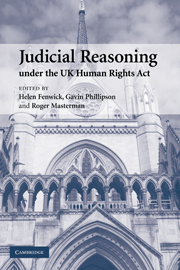Book contents
- Frontmatter
- Contents
- List of contributors
- Foreword
- Preface and acknowledgments
- Table of cases
- Table of legislation
- Table of treaties
- 1 The Human Rights Act in contemporary context
- PART I The interpretation of the Human Rights Act 1998
- 2 The European Convention on Human Rights and the Human Rights Act: the view from the outside
- 3 Aspiration or foundation? The status of the Strasbourg jurisprudence and the ‘Convention rights’ in domestic law
- 4 Institutional roles and meanings of ‘compatibility’ under the Human Rights Act 1998
- 5 Choosing between sections 3 and 4 of the Human Rights Act 1998: judicial reasoning after Ghaidan v. Mendoza
- 6 Clarity postponed: horizontal effect after Campbell
- 7 The standard of judicial review after the Human Rights Act
- 8 Principles of deference under the Human Rights Act
- PART II The Human Rights Act and substantive law
- Index
5 - Choosing between sections 3 and 4 of the Human Rights Act 1998: judicial reasoning after Ghaidan v. Mendoza
Published online by Cambridge University Press: 30 October 2009
- Frontmatter
- Contents
- List of contributors
- Foreword
- Preface and acknowledgments
- Table of cases
- Table of legislation
- Table of treaties
- 1 The Human Rights Act in contemporary context
- PART I The interpretation of the Human Rights Act 1998
- 2 The European Convention on Human Rights and the Human Rights Act: the view from the outside
- 3 Aspiration or foundation? The status of the Strasbourg jurisprudence and the ‘Convention rights’ in domestic law
- 4 Institutional roles and meanings of ‘compatibility’ under the Human Rights Act 1998
- 5 Choosing between sections 3 and 4 of the Human Rights Act 1998: judicial reasoning after Ghaidan v. Mendoza
- 6 Clarity postponed: horizontal effect after Campbell
- 7 The standard of judicial review after the Human Rights Act
- 8 Principles of deference under the Human Rights Act
- PART II The Human Rights Act and substantive law
- Index
Summary
The importance of judicial reasoning
Lord Justice Sedley has commented extra-judicially that, although the HRA's impact on modes of legal reasoning does not make headlines, it ‘may well turn out to be one of the most fundamental changes worked by the Act’. The HRA has brought the subject of judicial reasoning to centre stage, both in the decisions of the higher courts and in the academic commentary which sets out to analyse and understand them. This is largely a consequence of the fact that, when enacting the HRA, Parliament decided to place much of the burden of the Act's implementation on the interpretative function of the courts, by imposing on them the duty in s.3(1) to ‘read and give effect’ to all legislation in a way which is compatible with Convention rights, ‘so far as it is possible to do so’. Lawyers of every hue must now confront the fact that issues of judicial reasoning, in particular interpretive reasoning, have become central to understanding, analysing and predicting the ways in which the HRA will impact on all areas of the law.
But how well equipped are lawyers to address these questions of interpretative methodology which are now of such immense practical importance? For many, their legal education will not provide very much in the way of preparation.
- Type
- Chapter
- Information
- Judicial Reasoning under the UK Human Rights Act , pp. 114 - 142Publisher: Cambridge University PressPrint publication year: 2007
- 2
- Cited by



